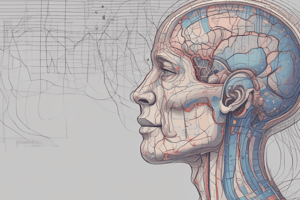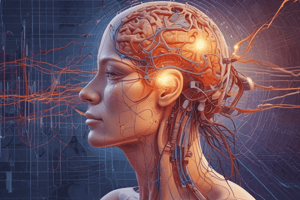Podcast
Questions and Answers
Which neurotransmitter is primarily associated with the communication deficits in Alzheimer's disease?
Which neurotransmitter is primarily associated with the communication deficits in Alzheimer's disease?
- Glutamate
- Dopamine
- Serotonin
- Acetylcholine (correct)
What is the primary mechanism of action of cholinesterase inhibitors in the treatment of Alzheimer's disease?
What is the primary mechanism of action of cholinesterase inhibitors in the treatment of Alzheimer's disease?
- Slowing the breakdown of acetylcholine (correct)
- Blocking the action of dopamine
- Increasing the production of acetylcholine
- Stimulating the growth of new neurons
Which type of brain cell is primarily affected in gliomas?
Which type of brain cell is primarily affected in gliomas?
- Schwann cells
- Ependymal cells
- Neuroglia (correct)
- Neurons
The loss of dopamine-producing cells in the brain is a primary characteristic of which neurological disorder?
The loss of dopamine-producing cells in the brain is a primary characteristic of which neurological disorder?
In Amyotrophic Lateral Sclerosis (ALS), which type of neurons are primarily affected?
In Amyotrophic Lateral Sclerosis (ALS), which type of neurons are primarily affected?
What does an electroencephalogram (EEG) primarily measure?
What does an electroencephalogram (EEG) primarily measure?
Which of the following is NOT a type of brain wave typically measured by an EEG?
Which of the following is NOT a type of brain wave typically measured by an EEG?
Which condition involves the buildup of fluid in the brain's ventricles?
Which condition involves the buildup of fluid in the brain's ventricles?
Which of the following best describes aphasia?
Which of the following best describes aphasia?
Which of the following is a common symptom of aphasia?
Which of the following is a common symptom of aphasia?
Which of the following scenarios would be most challenging for someone with aphasia?
Which of the following scenarios would be most challenging for someone with aphasia?
Which of these is NOT a characteristic of Alzheimer's disease, as described in the text?
Which of these is NOT a characteristic of Alzheimer's disease, as described in the text?
What are neurofibrillary tangles?
What are neurofibrillary tangles?
Flashcards
What happens to the brain in Alzheimer's disease?
What happens to the brain in Alzheimer's disease?
Alzheimer's disease affects communication between neurons in the brain by destroying synapses and neurons, leading to communication breakdown.
How do cholinesterase inhibitors work?
How do cholinesterase inhibitors work?
Cholinesterase inhibitors are medications that slow down the breakdown of acetylcholine, a neurotransmitter crucial for memory and learning. By slowing down this process, the medication increases the levels of acetylcholine in the brain, potentially improving cognitive function.
What are gliomas?
What are gliomas?
Gliomas are a type of brain tumor that originates from glial cells, which support and protect the brain.
What causes Parkinson's disease?
What causes Parkinson's disease?
Signup and view all the flashcards
What does ALS affect in the body?
What does ALS affect in the body?
Signup and view all the flashcards
Electroencephalogram (EEG)
Electroencephalogram (EEG)
Signup and view all the flashcards
Brain Waves (Alpha, Beta, Delta, Theta)
Brain Waves (Alpha, Beta, Delta, Theta)
Signup and view all the flashcards
Narcolepsy
Narcolepsy
Signup and view all the flashcards
Hydrocephalus
Hydrocephalus
Signup and view all the flashcards
Aphasia
Aphasia
Signup and view all the flashcards
Alzheimer's Disease
Alzheimer's Disease
Signup and view all the flashcards
Neurofibrillary tangles and Beta-amyloid plaques
Neurofibrillary tangles and Beta-amyloid plaques
Signup and view all the flashcards
Study Notes
Electroencephalogram (EEG)
- Electrodes are placed on the scalp to detect tiny electrical charges from brain cell activity.
- The charges are amplified and displayed as a graph on a computer screen or printed on paper.
- EEG is used to diagnose various brain disorders, including narcolepsy.
Brain Waves
- EEG records the electrical activity in the brain.
- Different brainwave patterns include alpha, beta, theta, and delta waves.
- These waves have different frequencies associated with varying brain states, such as alertness and sleep.
Hydrocephalus
- Hydrocephalus is a buildup of fluid within brain cavities (ventricles).
- This fluid buildup puts pressure on the brain, potentially causing damage.
- Enlarged ventricles are a sign of hydrocephalus, often leading to an enlarged head, especially in infants.
- Treatment may involve external drainage (temporary) or shunting procedures (permanently redirecting excess CSF).
Aphasia
- Aphasia is the loss of the ability to understand or communicate speech due to brain damage.
- It can affect various aspects of language, including speaking, understanding, writing, and reading.
- Causes include brain damage from any illness.
- Symptoms vary, depending on the location and extent of the brain damage.
- Speaking difficulties include struggling to find words or substituting unrelated words.
- Understanding difficulties include challenges with quickly spoken language or situations with background noise.
- Writing and reading difficulties include problems comprehending or producing written material.
Alzheimer's Disease
- Alzheimer's is a chronic and progressive neurodegenerative disease.
- Younger-onset Alzheimer's can affect individuals younger than 65.
- Characteristic features include neurofibrillary tangles and amyloid plaques. - Neurofibrillary tangles are abnormal protein accumulations within neurons. - Amyloid plaques are abnormal deposits of protein outside neurons.
- Alzheimer's affects communication between neurons, leading to memory loss, cognitive decline, and other symptoms.
- Acetylcholine is an important neurotransmitter affected in Alzheimer's.
- Cholinesterase inhibitors are a treatment approach for Alzheimer's. They slow down the breakdown of acetylcholine.
Brain Tumors
- Benign or malignant brain tumors can develop in the brain.
- Brain tumors can lead to common symptoms, such as headaches, seizures, and numbness or tingling in limbs.
- Gliomas are frequently occurring primary brain tumors, originating from glial cells (neuroglia).
- Subtypes of gliomas include astrocytomas (astrocytes), ependymomas (ependymal cells), and oligodendrogliomas (oligodendrocytes).
Parkinson's Disease
- Parkinson's is a progressive disorder affecting the nervous system.
- Symptoms include tremor, rigid muscles, impaired posture and balance, and reduced automatic movements.
- It results from a lack of dopamine due to the loss of dopamine-producing cells, which disrupts movement.
Amyotrophic Lateral Sclerosis (ALS)
- ALS, or Lou Gehrig's disease, is a neurodegenerative disorder affecting the brain and spinal cord.
- It targets motor neurons and leads to muscle weakness and progressive deterioration.
Stephen Hawking
- A notable figure with a profound impact on the field of cosmology.
Studying That Suits You
Use AI to generate personalized quizzes and flashcards to suit your learning preferences.
Related Documents
Description
Test your knowledge on key concepts in neurology, including Electroencephalograms (EEG), brain wave patterns, hydrocephalus, and aphasia. This quiz covers the mechanisms, diagnoses, and treatments associated with these conditions. Perfect for students studying neuroscience or psychology.





